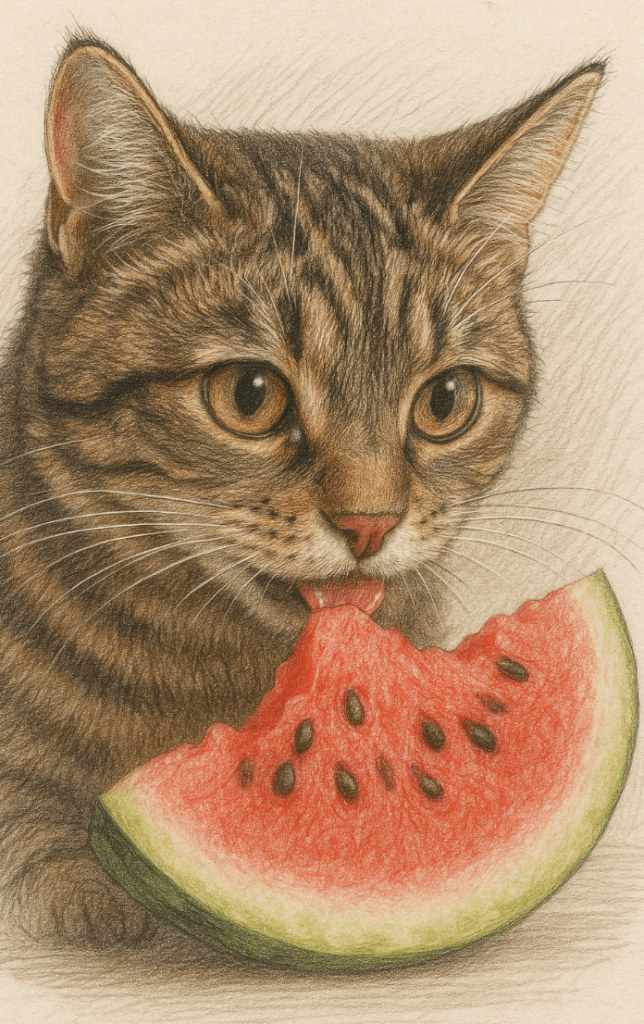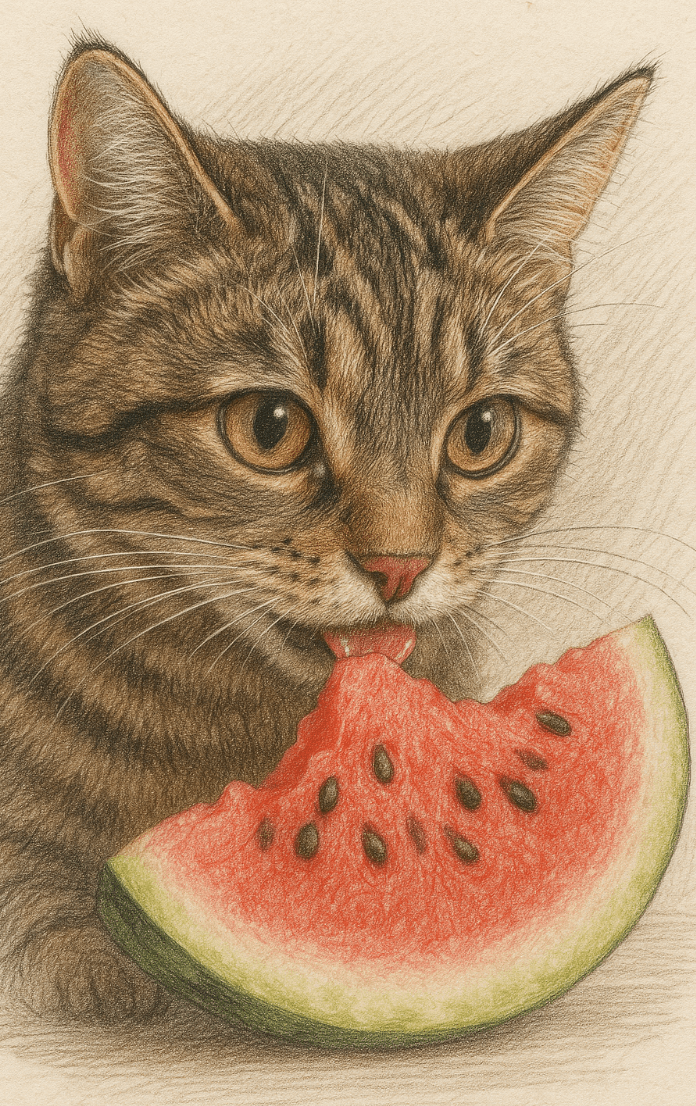Can Cats Eat Watermelon?
Watermelon is a refreshing and hydrating treat for humans, especially during hot summer days. But what about our feline friends? Can cats eat watermelon safely, or should this juicy fruit be kept off their menu? While cats are obligate carnivores and don’t require fruits in their diet, some pet owners wonder if occasional fruity snacks like watermelon could be a healthy addition. In this blog post, we’ll explore whether watermelon is safe for cats, the potential benefits and risks, and how to introduce it responsibly. By the end, you’ll have all the information you need to make an informed decision about sharing this summertime favorite with your furry companion.
Is Watermelon Safe for Cats?
Before offering watermelon to your cat, it’s essential to understand whether it’s truly safe for them to consume. Here’s a breakdown of the key considerations when feeding watermelon to your feline friend.
Non-Toxic Nature:
Watermelon is not toxic to cats, making it a generally safe option if prepared correctly.High Water Content:
With over 90% water, watermelon can help keep your cat hydrated, especially during warmer months.Low-Calorie Treat:
Watermelon contains minimal calories, making it a guilt-free snack for cats who need to watch their weight.Vitamins and Nutrients:
It provides small amounts of vitamins A, C, and B6, which can support overall health in moderation.Potential Allergies:
While rare, some cats may have sensitivities or allergic reactions to watermelon, so monitor for adverse effects.
When offered in moderation and without seeds or rind, watermelon can be a safe and refreshing treat for most cats.
How to Safely Prepare Watermelon for Your Cat
If you decide to share watermelon with your cat, preparation is key to ensuring their safety and enjoyment. Follow these steps to serve it properly.
Remove Seeds Completely:
Watermelon seeds can pose a choking hazard or cause digestive blockages if swallowed.Peel Off the Rind:
The tough outer rind is difficult for cats to chew and digest, so always remove it before serving.Cut into Small Pieces:
Bite-sized chunks are easier for cats to eat and reduce the risk of choking.Offer Only Fresh Watermelon:
Avoid canned or processed watermelon, as it may contain added sugars or preservatives harmful to cats.Start with Tiny Portions:
Introduce watermelon gradually by offering a small piece first to observe your cat’s reaction.
By taking these precautions, you can minimize risks and ensure your cat enjoys this fruity snack safely.
Check this guide 👉Can Cats Eat Spinach? Best 7 Expert Tips!
Check this guide 👉Can Cats Eat Bone Broth? Best 7 Expert Tips!
Check this guide 👉Can Cats Eat Carrots? Best 7 Expert Tips!

Benefits of Feeding Watermelon to Cats | Risks of Feeding Watermelon to Cats |
|---|---|
Hydrating due to high water content | Risk of choking on seeds or large pieces |
Low-calorie alternative to commercial treats | Potential digestive upset from overeating |
Contains vitamins that support immunity | Possible allergic reactions in sensitive cats |
Refreshing snack during hot weather | Sugar content may not suit diabetic cats |
Encourages curiosity and exploration | Overfeeding can lead to nutritional imbalance |
Signs Your Cat May Not Tolerate Watermelon
While many cats enjoy watermelon without issue, others may experience adverse reactions. Watch for these signs to determine if watermelon isn’t suitable for your pet.
Upset Stomach:
Vomiting or diarrhea after eating watermelon indicates digestive intolerance.Lethargy or Discomfort:
If your cat seems unusually tired or restless, it could signal an adverse reaction.Excessive Drooling:
Drooling might indicate irritation in the mouth or throat caused by the fruit.Loss of Appetite:
Refusal to eat regular meals following watermelon consumption suggests discomfort.Skin Reactions:
Itching, redness, or swelling could point to an allergic response to watermelon.
If any of these symptoms occur, discontinue feeding watermelon and consult your veterinarian promptly.
Alternatives to Watermelon for Cats
If watermelon doesn’t suit your cat or you’re looking for other fruity options, consider these safer alternatives.
Cantaloupe (Seedless):
Rich in vitamins A and C, cantaloupe is another hydrating option that many cats enjoy.Blueberries:
These antioxidant-rich berries are bite-sized and easy for cats to nibble on.Strawberries (In Moderation):
Strawberries offer vitamin C but should be given sparingly due to their sugar content.Pumpkin Puree:
Unsweetened pumpkin puree aids digestion and provides fiber, making it a great treat.Plain Applesauce:
Free of seeds and sugar, plain applesauce can be a tasty and safe snack for cats.
These alternatives provide variety while keeping your cat’s health in mind.
Common Mistakes to Avoid When Feeding Watermelon to Cats
Feeding watermelon to your cat requires attention to detail to avoid common pitfalls. Here’s what to watch out for.
Leaving Seeds In:
Seeds can cause gastrointestinal blockages, so always remove them thoroughly.Offering Large Chunks:
Big pieces increase the risk of choking, especially for smaller cats.Overfeeding:
Too much watermelon can upset your cat’s stomach or disrupt their balanced diet.Ignoring Individual Preferences:
Not all cats enjoy watermelon, so don’t force them to eat it if they’re uninterested.Using Processed Variants:
Sugary or preserved watermelon products can harm your cat’s health and should be avoided.
Avoiding these mistakes ensures a safe and enjoyable experience for your cat.
Nutritional Value of Watermelon for Cats
Although cats don’t require fruits in their diet, watermelon does offer some nutritional value when fed in moderation. Here’s a closer look at its components.
Hydration Support:
The high water content helps maintain hydration levels, particularly in active or senior cats.Vitamin A Benefits:
Promotes healthy vision and supports immune function in small amounts.Vitamin C Contribution:
Acts as an antioxidant, though cats naturally produce their own vitamin C.Low Fat and Protein-Free:
Makes it a light snack that won’t interfere with their carnivorous dietary needs.Natural Sugars:
Provides quick energy but should be limited to prevent excessive calorie intake.
Understanding these nutritional aspects helps you gauge whether watermelon fits into your cat’s overall diet.
Fun Ways to Serve Watermelon to Your Cat
If your cat enjoys watermelon, there are creative ways to incorporate it into their routine while keeping things exciting.
Freeze Small Cubes:
Freeze bite-sized pieces for a cool, refreshing treat on hot days.Blend into a Puree:
Blend seedless watermelon into a smooth puree and freeze it in ice cube trays for portion control.Mix with Catnip:
Sprinkle a pinch of catnip on top of watermelon chunks to entice hesitant cats.Pair with Other Safe Fruits:
Combine watermelon with tiny bits of cantaloupe or blueberries for variety.Create DIY Popsicles:
Mix watermelon puree with plain yogurt (if tolerated) and freeze in molds for a fun snack.
These ideas add creativity and fun to your cat’s snacking experience.
Frequently Asked Questions About Cats and Watermelon
Can kittens eat watermelon?
Yes, but only in very small amounts and under supervision, as their digestive systems are still developing.
How much watermelon can I give my cat?
Limit portions to a teaspoon-sized piece once or twice a week to avoid overfeeding.
What part of the watermelon is safe for cats?
Only the soft, fleshy part of the fruit is safe; avoid seeds, rind, and processed varieties.
Can watermelon cause diabetes in cats?
While watermelon itself won’t cause diabetes, its natural sugars should be limited in diabetic or overweight cats.
Should I consult my vet before feeding watermelon?
It’s always wise to check with your vet, especially if your cat has existing health conditions.
Making Smart Choices for Your Cat’s Diet
While watermelon can be a fun and hydrating treat for cats, it’s important to remember that their primary diet should consist of high-quality protein sources. Always introduce new foods like watermelon cautiously, monitor your cat’s response, and prioritize their safety above all else. By understanding the benefits and risks, you can confidently decide whether watermelon is right for your furry friend. Remember, every cat is unique, so what works for one may not work for another—trust your instincts and seek professional advice when needed.
Do Cats Have Taste Buds? Best 7 Expert Tips! – Discover how cats experience flavors and why their taste is so unique.
Do Dogs Have Taste Buds? Best 7 Expert Tips! – Discover how dogs experience taste, their preferences, and what it means for their diet and health.
Can Cats Taste Sweet? Best 7 Expert Tips! – Discover why cats can’t taste sweetness, how it affects their diet, and tips to keep them healthy and happy.
Can Dogs Taste Sweet? Best 7 Expert Tips! – Discover how dogs perceive sweetness, which foods are safe, and tips to manage their sweet cravings responsibly.





